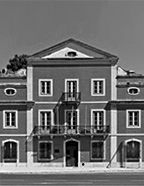

................................
With an interrupted history of one hundred and fifty years, the Real Academia da História Portuguesa [Royal Academy of Portuguese History] re-emerged from the ashes on 19 May 1936, bearing the new designation of Portuguese Academy of History. From 18 March 1937, the Portuguese Academy of History undertook its primary mission, which was to collaborate in the Double Centennial celebrations, according to the "... highly distinguished note from His Excellency the President of the Council which establishes the double Centennial Commemoration of the Foundation and Restoration of Nationality (1939-1940)" in an admirable programme. In fact, when Article 39 of Title V of the Rules of Procedure of the National Board of Education, contained in Decree 26.611 of the Ministry of National Education, published in the first series of the Official Government Gazette (D.G.) no. 116 of 19 May 1936, founded the Portuguese Academy of History, thought was given to the crucial importance of the institution for the commemoration project. The inauguration of the reborn Academy was scheduled for 1 December of the same year. However, it was postponed until the following year, when its statutes were published by Decree 27.913 of the same Ministry in the first series of D.G. no. 177 of 31 July 1937. They had been drawn up considering "... the organisation of the Royal Academy of Portuguese History, founded by King John V...". This same affiliation was assumed by the first President, António de Vasconcelos, who stated in his speech on 2 April 1938, "... the birth of this Portuguese Academy of History will carry on the glorious traditions of its predecessor, the Royal Academy of Portuguese History, which emerged in the 18th century at a very interesting and vibrant time, protected by the dedicated and effective action of great King John... We are, thus, confident that the current Portuguese Academy of History, beginning its life with no less enthusiasm, vigour and efficiency than that which animated the initial years of the Royal Academy of Portuguese History, and with copious fruits that are already showing signs of promise, will nevertheless have a long life and provide important services to Portugal in this century and in those to come...".
The king relied on the great enthusiasm of D. Manuel Caetano de Sousa, a Theatine with a vast historical, literary and theological culture, to give substance to this institution. He was joined by the Marquis of Alegrete, Fernão Telles da Silva, the Count of Ericeira, Francisco Xavier de Meneses, the Count of Villamayor, Manuel Teles da Silva, Martinho de Mendonça de Pina e de Proença and also D. António Caetano de Sousa.
